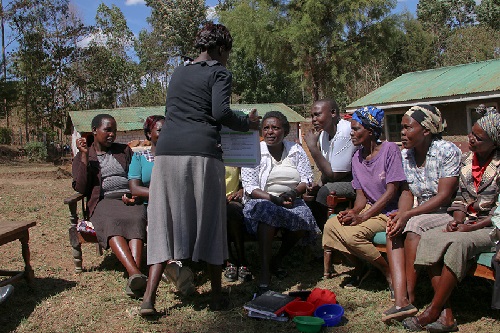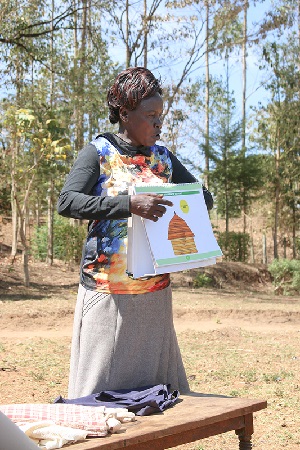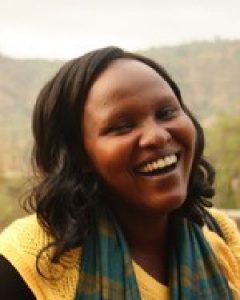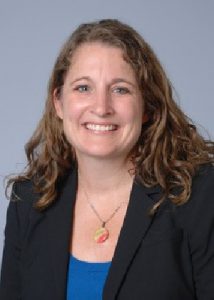
Mothers in each Chamas group typically meet twice per month and receive information about health, social topics and financial literacy.
Adolescents who become pregnant face social and health inequities that can lead to a variety of poor outcomes and higher levels of maternal and infant mortality. Researchers from Indiana University and Moi University School of Medicine in Kenya seek to improve the outcomes for pregnant teens and their babies with a $50,000 grant to adapt a successful peer support, health education and financial literacy program in Kenya and eventually in Indiana.
The Indiana Clinical and Translational Sciences Institute (CTSI), in partnership with the Indiana University Center for Global Health, sponsors this Global Health Research Award that seeks to foster innovative research partnerships and projects to improve the health and well-being of Hoosiers and people in resource-limited communities around the world.

Community health volunteers (CHVs) deliver information for pregnant, postpartum and parent mothers who have children around the same age.
Laura Ruhl, MD, MPH, assistant professor at IU School of Medicine, and Julia Songok, MBchB, MMED, Head of the Department of Pediatrics and Child Health at Moi University School of Medicine, are the principal investigators on the winning project built on the success of the Chamas for Change (Chamas) groups already in operation in western Kenya. Chamas are community-based, peer-support and education groups that use a three-year curriculum integrating health, social and financial literacy to improve health outcomes.
Women who are expecting around the same date typically meet two times per month for 60-90 minutes at a member’s home or local community location. Community Health Volunteers (CHVs) deliver a health and social education lesson and the members participate in microfinance activities to help build financial resources for health insurance coverage or to meet other family needs. Chamas are low-cost, community-run, independently sustainable and culturally accepted. Previous studies demonstrated that participants were more likely to practice positive parenting behaviors such as attending prenatal visits, delivering in health facilities and exclusively breast feeding for six months.
With support from Academic Model Providing Access to Healthcare (AMPATH) partners AbbVie Foundation and Grand Challenges Canada, the Chamas program is expanding rapidly throughout western Kenya. More than 2,916 women now meet in 270 groups. The Global Health Research Award provides funding to adapt the Chamas model to meet the unique needs of pregnant adolescents.

Julia Songok, MBchB, MMED
“Pregnant adolescent are not only at risk for poor health outcomes for themselves and their babies, but also are less likely to complete their education, obtain sustainable employment and be able to provide for their families in the future,” said Songok. “By adapting our Chamas program to provide the strong social support that adolescent mothers often lack, we believe we can positively affect the social determinants of health that contribute to poor health outcomes.”
The three-year project will commence this year in cooperation with the AMPATH partnership that includes Indiana University, Moi University and Moi Teaching and Referral Hospital (MTRH), and the Kenyan Ministry of Health. The Rafiki Center for Excellence in Adolescent Health was established by MTRH to provide general and HIV-specific care to adolescents including full-spectrum sexual and reproductive health care and will serve as a clinical and referral resource for the project. The adapted program will be piloted next year in ten groups in diverse communities in Kenya to evaluate the success of the adaptation and feasibility of the model. The final step of the study is to explore a similar adaptation for pregnant and parenting teens in Indiana.

Laura Ruhl, MD, MPH
“We believe that our adolescent Chamas program has significant potential for settings in Indiana where it could be further adapted and refined to meet the needs of pregnant and parenting adolescent Hoosiers,” said Ruhl.
The Indiana CTSI supports the identification, development, adaptation, and translation of health innovations produced through international research collaborations. They strive to identify solutions that are cost effective, easily scaled, and have high potential to improve the health of the most vulnerable people in the world. This funding opportunity is open to researchers at Indiana CTSI partner institutions (IU, Purdue, and Notre Dame) and their partners in low and middle income countries. Eligible proposals must be collaborative and include at least one principal investigator from an Indiana CTSI partner institution.
